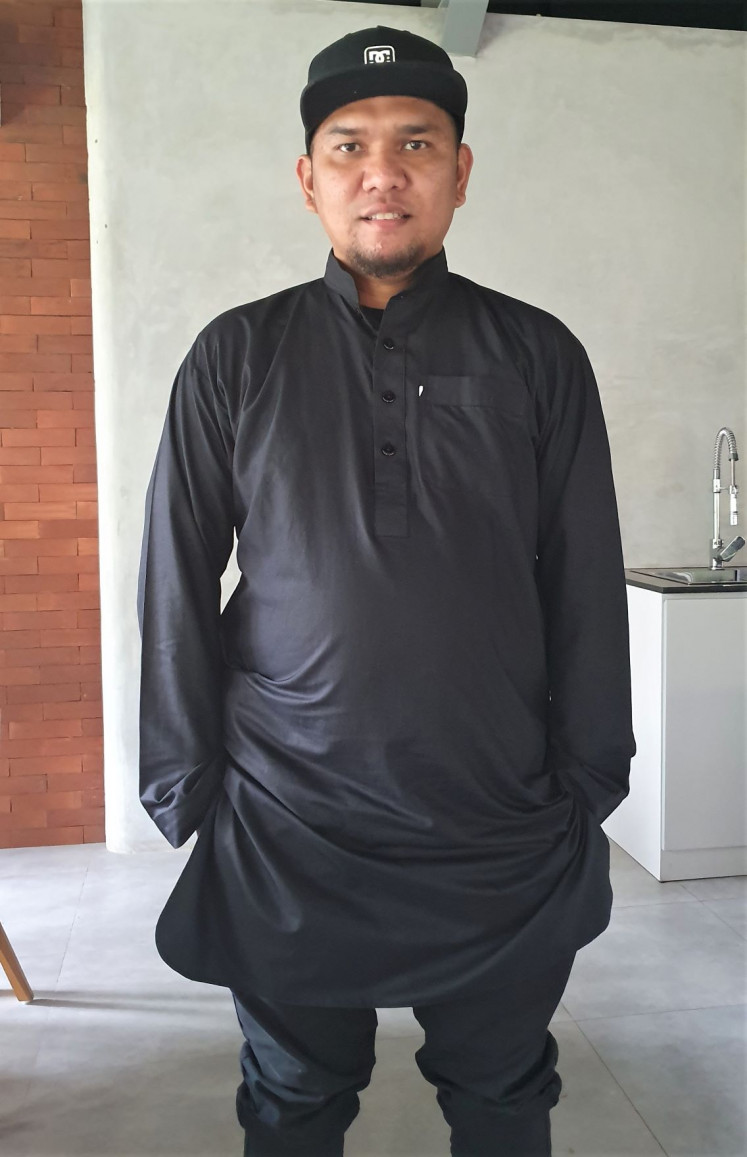Popular Reads
Top Results
Can't find what you're looking for?
View all search resultsPopular Reads
Top Results
Can't find what you're looking for?
View all search resultsFajar Bustomi: Set to shake off teen flick image
As the man behind many of Indonesia’s biggest box office hits, director Fajar Bustomi’s journey offers insights into the dynamics of the country’s film industry.
Change text size
Gift Premium Articles
to Anyone
F
ajar Bustomi’s latest teen romantic comedy Mariposa was among the few films released in theaters in mid-March before the virus scare hit the film industry hard.
With COVID-19 restrictions yet to come into force, 140,000 people watched the film on its first day of release, helping it to become the fourth most-viewed film in the first quarter of this year, with 730,000 viewers over two weeks.
Starring the beloved on-screen couple of Adhisty Zara of girl group JKT48 and Angga Yunanda, it follows two exceptionally intellectual teenagers and the story of how they find love.
The two previously starred in box office smash Dua Garis Biru (Two Blue Stripes) by Gina S. Noer, which tackles the issue of teen pregnancy and won many accolades including Best Feature Film at the Piala Maya 2019 independent film awards.
Their appearance in Mariposa was not the only key to its success – they were cast long before the release of Dua Garis Biru – nor other marketing gimmicks.
With Powerhouses Falcon Pictures and Kharisma Starvision Plus joining hands for the production, there appears to have been a change in perception in how teen movies can be made in the wake of the major success of Dua Garis Biru and Fajar’s Dilan trilogy.
The first part of the trilogy, Dilan 1990, was the most-watched film of 2018 with 6.3 million viewers, and second all-time after comedy film Warkop DKI Reborn: Jangkrik Boss! Part 1 with 6.8 million viewers. Both were produced by Falcon.
Mariposa – Spanish for butterfly – is an adaption of a novel of the same name by Hidayatul Fajriyah. The film was also the first of its kind to use a widescreen, anamorphic format, which, according to the director, would allow the viewers to feel as though they were part of the movie.
“A teen film also deserves serious production. The audience was cheering and laughing hard watching Dilan 1990, but it was louder and more intense for this film,” said Fajar in an interview with The Jakarta Post at Falcon Pictures’s office in Tebet, South Jakarta.
As soon as he arrived, he cleaned his hands with wet wipes he kept in a small sling bag, from where he also took out a pack of mints and biscuits. “I came prepared,” he said unasked.
Born in Jakarta on July 6, 1982, from an Acehnese father and Minang mother, Fajar was brought up in a pious Muslim family that holds on close to the teachings of Prophet Muhammad, especially the lesson that, “The best person is the one who benefits all human beings”.
The teaching not only shaped Fajar’s mindset, but also set the foundation for his choice of career.
Fajar was in his second year of high school when he first became interested in filmmaking after watching Rudi Soedjarwo’s indie movie Bintang Jatuh (Falling Star) that saw the debut of starlet Dian Sastrowardoyo.
The late 1990s was also the peak era of MTV, which he watched to enjoy music clips made by Dimas Djayaningrat, Rizal Mantovani and Jose Poernomo.
“I was determined to study film directing at the Jakarta Arts Institute. I even went to the campus to gather information.
“But watching Steven Spielberg’s Schindler’s List made me realize that a movie could send strong messages and inspire people in such a beautiful way. I needed to be a filmmaker,” he said.
Man in black: Filmmaker Fajar Bustomi poses for a picture at Falcon Pictures’ office in Tebet, South Jakarta. (JP/Tertiani ZB Simanjuntak)His first film job upon graduation was to direct a teen movie titled Bestfriend? which was released in 2008. In the film poster, his name was written as Fajar Bgt, which he said was written without his consent simply to distinguish him from many others with the same name on the crew list.
The film attracted 250,000 viewers, which should have been seen as a success for an unknown director making his debut, but he took it hard when the producers compared it to the erotic horror film released at the same time that was watched by 1 million.
He shifted focus to creating music videos until an opportunity came his way. In 2013, he directed Slank Nggak Ada Matinya (Slank Never Dies), made to celebrate the rock band’s 30th anniversary.
“The viewership was about 300,000. Not much, but the producers did not belittle me over the number,” said Fajar, who decided not to stay at one production house.
From then on he has continued making films – mostly teen movies because “it’s a world full of energy and reminds me of my beautiful teen years” – and has become known for his simplistic approach, similar to the styles of Clint Eastwood or the early works of Iranian director Majid Majidi.
“A good movie doesn’t need unnecessary flair. I’m the kind of director who wants to see everything on the script appear on the screen. I will not omit a thing so I can add my personal traits or so-called signature.”
As a person with dyslexia, he uses his special gift to filter the scripts handed to him. Unless the script “speaks” to him, he can only see matrices of letters instead of words.
His reading disability is also the reason he flunked the written test for his major, film directing, at the Jakarta Arts Institute. He repeated the year and received an A after the new professor replaced the written test with a film thesis.
“My classmates passed with flying colors because I shared my answer sheet with them. They graduated earlier, but I was ahead of them getting a directing job.
“I’m always grateful, because of this disorder I used to study harder than the rest and learned to speak so I could ask questions in class,” said Fajar.
Being meticulous and prudent, it took him four years to finish writing the script for his first high-budget project – a biopic about Buya Hamka, an Indonesian cleric, philosopher and writer.
The film, which was scheduled for release this year, will follow Hamka from childhood until his last days, including the period in which he was imprisoned on accusations of subversion during the reign of founding president Sukarno.
“I’d like to emphasize his grounded and sincere personality that enabled him to be the imam who led the funeral rites for the one who put him in prison. This film will be my own Schindler’s List,” he said.
Next in the pipeline of his personal projects is to make an action movie to promote Indonesian martial arts.
“It must have a good drama. The strength of a movie lies in its drama, besides the plot. It plays with your emotions and it can make you forget that you’re actually watching a movie. I think whatever the genre is, I will always be drawn to visualizing dramas.” (ste)












